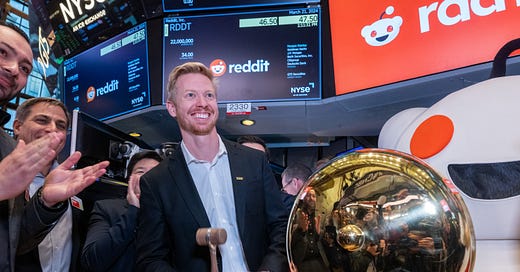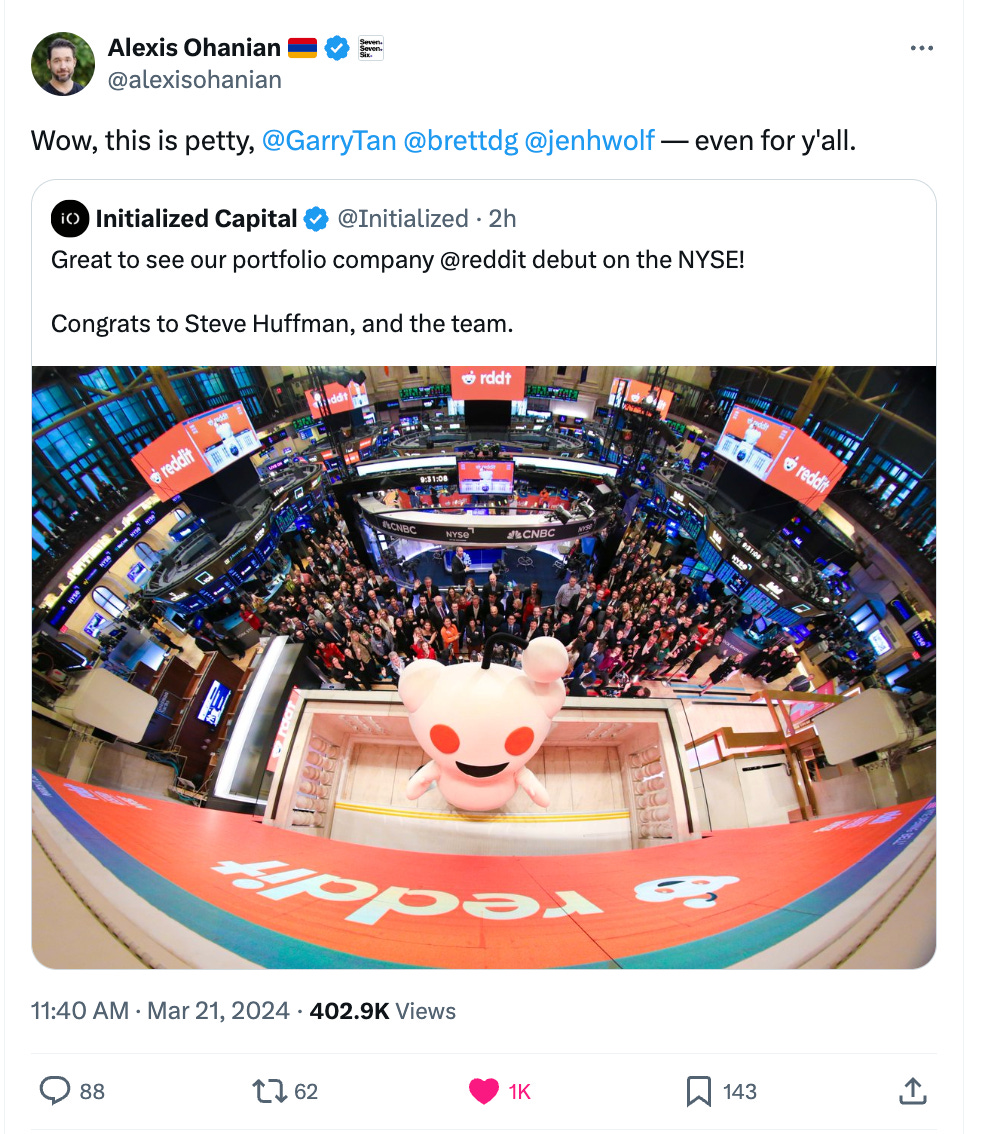Reddit IPO Is a YC Origin Story…Microsoft’s Inflection Deal…IVP in the VC Directory
Plus, Redpoint makes the case for the venture slowdown ending
Hey, it’s Madeline. Let’s get into it.
The Main Item
Reddit’s Y Combinator Origins at the Forefront of its Public Debut
The mostly-frozen tech IPO market began to show signs of life this week as global markets soared with Reddit enjoying a day as a Wall Street hero. Thursday’s IPO follows a very long and bumpy climb for Reddit from its 2005 debut as a charter member of Y Combinator.
The IPO cheer began with data center connectivity chips seller Astera Labs, which priced its shares at $36, the high end of its projected range, and closed its first trading day Wednesday up 72%. The company has a good AI story and investors are buying it.
On Thursday, it was Reddit’s turn to take the stage as the first social media company to go public since Pinterest in 2019. Reddit also priced at the high end of its range, at $34 a share, and also saw a nice first-day pop, with shares opening at $47 and closing at $50.44.
Reddit has had many investors and boosters over the years, and no small amount of corporate drama. Old-media stalwart Advance Publications, parent of fashion publisher Condé Nast, was the biggest financial winner Wednesday: it bought Reddit outright at one point for a mere $10 million and now owns a 30% stake that could be worth north of $2 billion.
Yet Reddit’s DNA is entwined not with the New York media business, but with that most Silicon Valley of startup institutions, Y Combinator. It’s far from the celebrated incubator’s first IPO (there have been 19 so far), but Reddit holds the distinction of being the very first YC company, as former group partner Yuri Sagalov pointed out.
Michael Seibel celebrated the occasion by posting pictures of the Reddit mascot celebrating at the NYSE on X.
It all harkens to a time when Y Combinator, and the venture capital and startup world overall, were far smaller: there were just 8 companies in that first YC class, compared with hundreds these days, and everyone really did know everyone.
The Reddit and YC origin stories begin in 2005 when Alexis Ohanian and Steve Huffman traveled from Virginia, where they were college students, to Cambridge, Mass., to hear a talk by Paul Graham, the future co-founder of YC, at the Harvard Computer Society. Graham was known as the co-founder of Viaweb and a hotshot Lisp programmer; he was also a prolific essayist and eager to invest in the ventures of smart, motivated young people.
“In fact they were one of the reasons we started it,” Graham wrote of YC and Reddit. Some remember Graham pushing Ohanian and Huffman toward the idea of a social network in the first place, after rejecting their initial proposal for a mobile delivery app.
Many of Reddit’s batch-mates from that original spring 2005 class in Boston crossed paths with the company afterwards. When Chris Slowe and his co-founder Zak Stone decided to wind down their YC startup Memamp, Slowe had space available in his apartment near Harvard, and Huffman and Ohanian moved in. Soon, they brought Slowe onboard as Reddit’s founding engineer. Today, he’s Reddit’s CTO.
Sam Altman, the Open AI CEO, was also part of Y Combinator’s inaugural batch with a company called Loopt, and he made various investments in Reddit over the years. Altman-run entities owned a stake worth $415 million at the start of trading Thursday, according to The Information, both through personal investments and via entities such as Apollo Projects and Hydrazine Capital.
Altman has been a loyal Reddit user since its founding days, and led the company’s $50 million Series B round in 2014, while he was president of YC. “I was probably in the first dozen people to use the site, and I shudder to imagine the number of hours I have spent there,” he wrote in a blog post at the time.
According to Dan McComas, Reddit’s former SVP of product, Altman became a crucial advisor after investing. “He was in every meeting—he was somebody as the VP of product that I could call and just bounce off ideas.”
Another YC batch-mate, Aaron Swartz, joined Reddit as a co-founder after ceasing work on his startup, Infogami. Swartz left after the Condé Nast acquisition in 2006, and tragically died by suicide in 2013 after facing 35 years in prison for alleged hacking crimes that most in the tech world considered a farce.
Despite being a pioneer of social media, Reddit has often struggled to monetize its extremely loyal but highly opinionated denizens, who tend to revolt over company efforts to make money. The company churned through several CEOs before Huffman took the chair in 2015.
Huffman in turn has weathered his share of brickbats from cranky loyalists, but he wanted to reward the most prolific community members and subreddit moderators—who run most of the site’s content moderation free of charge—by allowing them to buy stock at the offering price. It’s a risky move, for sure, given the way certain subreddits, led by r/wallstreetbets, have proven able to manipulate stock prices (see the GameStop saga), and the risk of a falling price alienating users.
Former CEO Yishan Wong told Newcomer over email that he hopes “Redditors understand how volatile things like this can be.”
And even with a successful IPO, the personal conflicts that always seem to be popping up around Reddit aren’t going away.
Reddit investor Initialized Capital was co-founded by Ohanian, Harj Taggar and Garry Tan. Several years ago, Tan and Ohanian had a rift and Ohanian left Initialized to start his own venture fund. Later Tan stepped down as Initialized’s leader to run Y Combinator.
On Thursday, Initialized tweeted out a congratulations to Reddit and Huffman that failed to mention Ohanian as a co-founder.
Ohanian chirped back:
Personal snarking is perhaps another indelible bit of the Reddit DNA.
AI Antics
Microsoft’s Non-Acquisition Acquisition
Hey, it’s Eric.
It’s a tale of two antitrust postures.
On Thursday, the Justice Department sued Apple for allegedly monopolizing the smartphone business. U.S. antitrust regulators are also going after Google, Meta, and Amazon.
Microsoft, meanwhile, the most valuable company in the world, forged in the fire of antitrust litigation, is pushing the boundaries of what it means to not acquire a company. Under CEO Satya Nadella and longtime general counsel and president, Brad Smith, Microsoft is proving quite innovative in how to avoid big antitrust lawsuits—or win them when they come, as it did with Activision.
This week, the company announced it was hiring away the founders and much of the staff of Inflection, an AI foundation model company led by DeepMind co-founder Mustafa Suleyman. Microsoft will pay what’s left of the company $650 million to keep its well-connected VC investors happy1, The Information reported, making it all look very much like an acquisition in some other kind of clothing.
The Inflection deal is of course the second time that Microsoft has run this sort of playbook in the AI race. Its still largely-secret partnership with OpenAI has Microsoft funneling some $10 billion to OpenAI and holding a 49% stake in the company, which is technically overseen by a non-profit.
We learned when OpenAI CEO Sam Altman was briefly ousted that Nadella felt he had a tight grip over what mattered at OpenAI should things unravel. Nadella said, “We have all the IP rights and all the capability. If OpenAI disappeared tomorrow, I don’t want any customer of ours to be worried about it quite honestly, because we have all of the rights to continue the innovation. Not just to serve the product, but we can go and just do what we were doing in partnership ourselves.”
So Microsoft seems to be pioneering the non-acquisition acquisition. Microsoft gets everything it needs from a potential upstart rival without the hassle of antitrust review at a time when authorities in both Europe and the U.S. are moving aggressively to prevent big tech from getting even bigger.
Amusingly, the disgraced “pharma bro” Martin Shkreli called me “this snitch” on X for pointing out that Microsoft’s Inflection deal looked a lot like an antitrust end run.
I’m sympathetic.
Like many people in startup world, I have mixed feelings about regulators’ activist impulses.
On the one hand, it’s frustrating that big tech companies have run roughshod over startups and made it difficult for new companies to succeed, and sometimes left consumers with fewer choices.
On the other hand, acquisitions are the lifeblood of the venture capital industry and there’s a real risk that innovation will be discouraged if a full-fledged IPO is the only viable path for a home-run exit. Startups need to get bought for billions of dollars from time to time for this whole venture capital thing to work.
But as someone who believes in honesty and transparency, I hate what’s going on with Microsoft’s strange partnerships. Artificial intelligence is seismically important to society and we deserve to know far more about Microsoft’s relationship with OpenAI— and now, about Microsoft’s deal with Inflection. These are potentially dangerous precedents.
Of course, Microsoft can’t just escape regulators by avoiding acquisitions. The Federal Trade Commission is looking at Microsoft’s partnership with OpenAI, for instance.
But sidestepping the chance that regulators might block an acquisition definitely beats maybe facing some speed bump consequence down the line.
Investor Gavin Baker posted, “If the Microsoft/Inflection deal stands, then this is the roadmap for every large tech company to make acquisitions.”
What I really want is for regulators to beef up public disclosure requirements and widen the definition of what’s considered “material,” so companies like Microsoft have to share more about these “partnerships” with the public.
Much of the blame for Microsoft’s creativity here falls at the feet of regulators: If regulators constantly (and unreasonably) block acquisitions, our greatest business minds will obviously find workarounds.
Capitalism finds a way.








